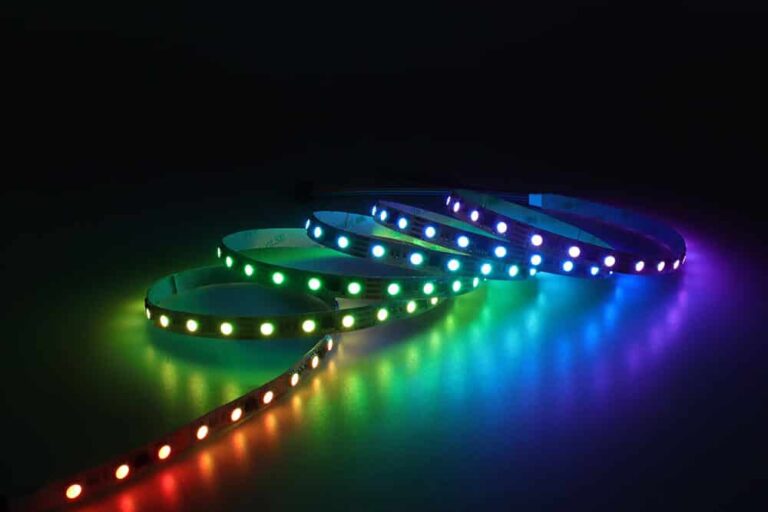How to Select the Ideal LED Strip Lights for Your Kitchen Cabinets
Table of Contents
Contemporary homes commonly feature open-concept kitchens integrated into the living room space. This open design is often illuminated and enriched by LED strip lights, giving the kitchen a dynamic and energetic ambiance. Before delving into this further, it’s important to understand what LED strip lights are. An LED strip light is a flexible circuit board with many small LED bulbs, designed to be installed almost anywhere. It provides bright, vibrant lighting with a range of shimmering colors.

Given the plethora of LED strip light options on the market, selecting the ideal one for your kitchen without proper knowledge can be challenging. Hence, this article aims to guide you through choosing LED strip lights for your kitchen. We’ll first examine various design options for kitchen cabinet decoration, which will aid us in selecting the most suitable strip lights.
How to Choose the Right LED Strip Lights for Kitchen Cabinets?

Now let’s address the crux of our discussion: how to choose the best LED strip lights for your kitchen cabinets. What factors should you consider during selection? Here are some key considerations:
- Waterproof
- Adjustability
- Lighting color
- Brightness level
- Optimal color temperature (CCT)
- Best voltage option
Waterproof:
As we’re all aware, electronics and water don’t mix. This truth applies to LED strip lights too. Therefore, when choosing LED strip lights for your kitchen, choosing a waterproof variant is best. This trait can guard against potential damage from water.
Adjustability:
The ambiance in your kitchen can reflect your ever-changing mood. At times, you might crave a warm, romantic feel, or other times, a bright, energetic one. To cater to this, opt for CCT adjustable LED strip lights. These lights can help you generate a variety of atmospheres to suit your mood.
For example, you can turn up the brightness during dark weather and create a cozy environment with dimmed lighting when you desire warmth. This adjustable feature is incredibly beneficial, hence why I highly recommend it.
Lighting Color:
It’s undeniable that various colors and atmospheres can sway our mood. There’s even expert testimony that the right kitchen lighting can enhance your appetite – an intriguing notion, right?
With LED lights, you need not worry about the color factor. The RGB color LED strip lights these utilize can emit any color you choose.
Optimal Color Temperature:
You may wonder, what exactly is color temperature? Allow me to simplify. Color temperature describes the visual output or ‘appearance’ of light from a bulb, measured in kelvins (K).
Choosing LED lights with the right color temperature is crucial. The lower the temperature, the warmer the light. Typical LED lamps come with three color temperature categories:
Cool White:
Offering the most intense lighting, cool white can be somewhat strenuous for the eyes due to its bluish hue. It is best used in areas requiring high-intensity illumination.
Warm White:
Comparable to the soft glow of a sunset, warm white may have a slight yellow tint. If a cozy, tranquil environment is what you seek, this is your go-to choice.
Neutral White:
Neutral white, which resembles daylight, is an excellent choice for LED strip lights in the kitchen.
Lights falling within the 3000-4000 K range are most suitable for kitchen cabinets. However, it’s recommended to stay below 4000 K for the ideal ambiance. Most household lighting typically ranges from 2700-3000 K.
If you’re uncertain about the optimal color temperature, dynamic, tunable white LED strip lights might be the solution. While these LED lights allow you to adjust the color temperature from 2700 K to 6200 K, remember that they are pricier due to their advanced capabilities.

Optimal Voltage Selection:
LED strip lights can be primarily classified into three categories based on their voltage:
- 12V LED lights
- 24V LED lights
- 48V LED lights
The voltage choice should be made considering the nature and size of your project. However, we recommend opting for 12V or 24V LED lights, primarily since 24V variants are widely popular for kitchen cabinet lighting.
48V LED strip lights could be your go-to option for projects demanding longer run lengths.
Brightness Considerations:
One crucial characteristic to factor in when choosing lights is their brightness level. Brightness, measured in lumens or nits, signifies the amount of visible light produced by a source. Higher the lumens or nits, the greater the brightness.
The ideal brightness of LED lights in your kitchen can vary based on several elements, such as the size of your cabinets, the distance of the counter from the lights, and the kind of ambiance you wish to create. Therefore, selecting the right brightness level is a nuanced process that requires thoughtful consideration.
Different Methods to Set Up LED Strip Lights in Kitchen Cabinets:
The following methods can be used for installing the LED strip lights:
- Underneath the cabinets
- Over the cabinets
- In conjunction with floor cabinets
Underneath the Cabinets:
Many kitchens feature wall-mounted cabinets. It’s common to see kitchen cabinets placed on the floor and affixed to walls.
We can embellish the cabinets for such kitchen setups by installing LED strip lights beneath them. The lights can be affixed right under the cabinets or the kitchen console table.
The color of the lights can be tailored to your preferences. I tend to prefer lighter and brighter colors. White is a classic choice, but you might also consider hues such as golden, pink, or sky blue. Ultimately, the decision is yours. Once installed, you’ll be amazed at the vibrant ambiance they create.

Over the Cabinets:
In some kitchens, cabinets are mounted near the ceiling. In such cases, affixing the LED strip lights at the intersections provides an optimal effect. You’ll be amazed at how it transforms your kitchen’s aesthetic.
While the final decision is yours, aligning your kitchen and living room lighting can create a harmonious blend in your home’s atmosphere.

Floor Cabinets Lights:
In many kitchens, floor cabinets are a common alternative to wall cabinets. We can set up LED lights on these cabinets and use them to create interesting reflections on the wall compartments.
These lights come with various lighting effects that can be adjusted to create different atmospheres throughout the kitchen. Whether you’re looking for a warm, romantic, or bright ambiance, the choice is yours.

Installation Procedure of LED Strip Lights in Kitchen Cabinets:
Now that we’ve covered how to choose the appropriate LED strip lights let’s walk through their installation process. Here are the steps you should follow:

Step 1: Test Your LED Strip Lights Before Installation or Trimming.
Before installing the lights in your kitchen, testing their functionality is critical.
- Always switch off the power in the area where you’ll be handling the electrical components to prevent any risk of electrical shock.
- Attempt a dry run of the installation. Arrange the lights in the way you intend to install them.
- Confirm that you possess all the necessary equipment.
- Power on the strip lights to verify their functioning.
- Assess if the lights fulfill your requirements through a thorough examination.
Step 2: Measure Your Kitchen Cabinets and Assess Your Kitchen Environment.
Determine the length and size of your kitchen cabinets. Given the diverse range of LED strip lights available, selecting the right fit is important. We’ve previously discussed how to go about this selection process.
Next, examine your kitchen environment. Opt for lights with enhanced water-resistant properties if it’s prone to water exposure. Additionally, you can choose LED strip light colors or other features according to your preference.
Trim the LED strip lights per your kitchen cabinets’ measured dimensions. It’s vital that the sizing is precise, neither more nor less than required. Unwanted joints or extra length can detract from the overall aesthetic.
Step 3: Conduct a Comprehensive Cleaning of Kitchen Cabinet Surfaces
The process of installing strip lights has been ongoing for a while. Since you’ll unlikely disassemble them shortly, cleaning the cabinet’s surface is vital. Ensure the surface is completely dry before installation to prevent the potential risk of an electrical spark when the system is powered.

Step 4: Unpack the Lights and Proceed with Installation
With the lights now cut to the desired length, it’s time for installation. Remove the tape from the lights and secure them in their intended locations.

Step 5: Establish a Connection to the Power Source
The LED lights come with a controller and an adapter. Connect these to the strip and the power source. Be cautious not to connect to the power supply in reverse, as this will render the system nonfunctional.

Why Should You Opt for LED Strip Lights for Your Kitchen Cabinets?
In the contemporary era, our needs have evolved. We’re now leaning towards open kitchens with relaxing, aesthetic designs. There are a variety of lighting options that can create this ambiance, so why choose LED strip lights? There are several key advantages that these lights have over alternatives:
Advantages include:
- High efficiency and energy conservation
- Minimal heat output
- Extended lifespan
- User-friendly installation
- Versatility in light settings
High Efficiency and Energy Conservation:
News debates regarding energy conservation have become commonplace. The global community is prioritizing energy efficiency and renewable energy sources. The lighting industry has made significant strides in this area, with LED strip lights being energy efficient and cost-effective.
Minimal Heat Output:
LED lights and displays are notable for their thermal efficiency. They generate and radiate minimal heat, ensuring your kitchen remains cool.
Extended Lifespan:
LED strip lights are renowned for their longevity. They outlast traditional lamps significantly, saving you from frequent replacement expenses.
User-friendly Installation:
The installation process for LED strip lights is straightforward, as detailed in the steps above.
Versatility in Light Settings:
Traditional lights lack the adaptability that LED strip lights offer. You can adjust the colour and settings with LED strips to match your mood and preference.
Conclusion
In the preceding sections, I have endeavored to elucidate the concept of LED strip lights, which are fast becoming an indispensable feature of contemporary kitchen designs. This article offers insights into the selection and installation process of LED strip lights for your kitchen cabinets.
We are an esteemed manufacturing facility known for crafting top-tier, tailor-made LED strips and LED neon lights. If you want to purchase LED lights, please do not hesitate to contact us.
FAQs
For kitchen cabinets, LED strip lights with 300–600 lumens per meter are ideal for task lighting, while 100–300 lumens are suitable for accent lighting.
Yes, waterproof LED strip lights with at least an IP44 rating are recommended for kitchen cabinets, especially near sinks or stoves.
Yes, motion sensors can be paired with LED strip lights in the kitchen for convenience and energy savings.
Yes, using a diffuser with kitchen cabinet LED strip lights softens the light, reduces glare, and gives a cleaner appearance.
The best placement for LED strip lights under kitchen cabinets is near the front edge to evenly illuminate the countertop.
Yes, LED strip lights in kitchen cabinets can be controlled using smart apps, remotes, or voice assistants for easy operation.

Hi, I’m Xylia Xiong, a sales professional with 14 years of experience in the LED strip light industry. I specialize in providing tailored solutions, leveraging my expertise in LED products and the latest industry trends. Known for effective communication and problem-solving, I’m dedicated to helping lighting manufacturers, importers, and distributors achieve their goals.
Let’s work together to create customized solutions that exceed expectations.
Related Posts

The Best LED Strip Lights You Can Buy Right Now

Comparing WS2811 Vs WS2812B: Key Differences


